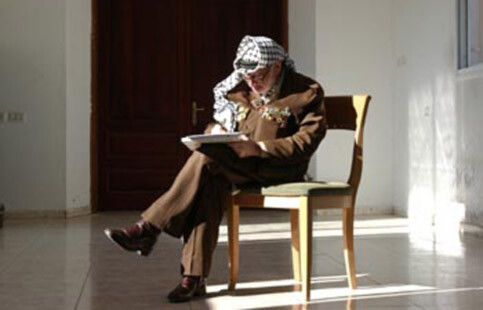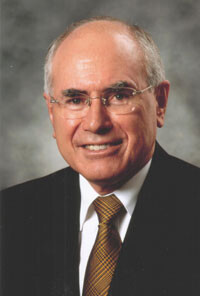Sydney 17 November 2004

Land is being stolen, as the whole world watches. The olive orchards, in which my ancestors planted for our generations, are confiscated and razed for the sake of an apartheid wall. News commentators and terrorism experts never comment on this as “a barrier to peace.” They dare not draw as much attention to it as they have to Arafat’s death, which has not only closed a chapter in the Palestinian narrative, but has given them an opportunity to attack the Palestinians.
I had never personally met Arafat. On the streets of my home Ramallah, before the recent Intifada, I would see his car zoom past with a man wrapped in a kafiyeh, waving his hand from behind the window. Most Palestinian have mixed feelings towards the death of President Arafat, and the Palestinians living in the west have been tormented by the media’s bias and motives to demonise the Palestinian people. And world leaders around the globe also have mixed feelings.

Australian Prime Minister John Howard
Like the Palestinians, Indigenous Australians are the victims of policies from a foreign, neo-colonial government. History would also harshly judge John Howard, as his comments illustrate a case of ‘the ignorant pot calling the kettle black’. His limited, or perhaps ignorant, knowledge of Camp David, and the daily oppressions of the Palestinians, is his greatest flaw.
I am still trying to workout the significance of Camp David talks in July 2000, and how it correlates with the funeral proceedings in Ramallah. The western media has almost drowned in their own vomit, constantly regurgitating the issues of Arafat’s corruption and Camp David. It encourages me to wonder how the media would react to the death of Ariel Sharon. Would they focus on his role in the horrors of Sabra and Shatila?
The beginning of the Arafat story would show his desire to achieve self-determination for the Palestinian people. Well before the murder and colonisation that began in 1948, Palestine had a history of having an occupying ruler. My Grandfather’s stories take me back to his experiences with the British and Ottoman empires. The notion of self-determination means deciding one’s own affairs, this basic human right has long been a struggle for the Palestinian people. Just like other world leaders, Arafat is corrupt, yet he his significant to the struggle for autonomy, which is inextricably linked to the Palestinian narrative.
The media has paid minor attention to this. The large emphasis on Arafat’s corruption is a shift away from the important issues. So-called ‘balanced journalism’ has mocked Palestinians worldwide. The massive focus on his death has been misused to sell front page news on tabloids. The Palestine Red Crescent Society reported the recent Intifada deaths of Palestinians reaching 3,441. Why hasn’t the media paid as much attention to this horrific figure as they have to the death of Abu Ammar?
Perhaps the western media could consider the corruption of their own leaders; George Bush’s election win in 2000; Tony Blair’s insistence that his soldiers would find weapons of mass destruction in Iraq; John Howard’s treatment of refugees and Aboriginal people. Again, ‘the pot calling the kettle black’.
In the past few days I have been asked about my feelings towards the death of Arafat by a number of students at university. Just as every other Palestinian, my feelings cannot be boxed one way or the other. As this event marks the passing of a unique Palestinian. One whom powerfully resisted in the struggle for my people, at the same token, was neglectful and corrupt. Peace will not be easily achieved with his passing, as there are no plans to remove the wall, the olive orchards are still gone, the illegal settlements are still polluting ‘67 Palestine, and the exiled refugees worldwide will not suddenly be allowed to return home.
Unlike the Western media, I hope history books in the future connect the story of Yasser Arafat with the struggle for freedom and justice in Palestine. I would also hope they mention the ongoing abuse of Palestinians, as we are coming to the end of its 56th year.
Related Links
Rayan Natour is an Australian born Palestinian activist from Ramallah. He currently resides in Sydney, studying a combined degree in Political Science and Social Work. Rayan lived in Ramallah in 1997-99 before the eruption of the recent Intifada.


